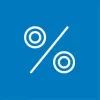The balances of Swiss bank accounts – also called bank deposits – are at least partially protected against bank bankruptcies. This depositor protection covers accounts held by both resident and non-resident individuals and entities. Accounts at a bankrupt bank which are held by other banks and financial services providers do not benefit from the same level of protection.
Depositor protection for customers of Swiss banks
According to Swiss financial supervisory authority FINMA, Swiss depositor protection works on a three-tier system. The three tiers of protection are: preferential deposits; protected deposits; bankruptcy privilege.
For all three tiers, preferential treatment and protection is limited. Before the financial crisis of 2008, the limit was 30,000 Swiss francs. In 2008, the limit was raised to 100,000 francs per person and bank.
Balances in excess of the limit do not benefit from special protection. When a bank goes bankrupt, the unprotected portion of balances falls under the third category of debt claims (non-priority bankruptcy claims).
Tier 1: Preferential deposits
When a bank goes bankrupt, up to 100,000 francs of account balances per customer are classified as preferential deposits. The bankrupt bank must repay as much of these preferential deposits as possible from its liquid assets.
Repayment of preferential deposits must be made promptly and without accounting for customer debt. This means that the bank cannot deduct debts owed it by a customer from repayment of the customer’s account balances which are classified as preferential deposits. Customers with debts have the exact same claim to repayment of preferential deposits as customers without debt.
Tier 2: Protected deposits
If the bankrupt bank does not have enough liquid assets to cover all of its customers’ preferential deposits, the Esisuisse depositor protection scheme steps in. This scheme insures up to 100,000 francs of account balances per customer and bank. The Swiss Federal Council has the authority to adjust this limit.
Swiss bank depositor protection is limited to a maximum covered amount equal to 1.6 percent of the total covered deposits at all Swiss banks combined, with a minimum of 6 billion francs of coverage. Currently, the 1.6 percent translates into a maximum of around 8 billion francs of coverage. This limitation does not pose a risk for customers of very small banks with covered deposits of less than 8 billion francs. But the relatively low limit means that bank depositor protection would not provide adequate protection if one or more larger banks failed.
Tier 3: Bankruptcy privilege
Account balances which are not repaid by the depositor protection scheme become bankruptcy claims. Up to 100,000 francs of balances per customer and bank fall under the second category of bankruptcy claims (privileged bankruptcy claims). Only bankruptcy claims which fall under the first category (priority bankruptcy claims) have a higher priority. First category claims include salary claims by bank employees, among others.
The chance of collecting on privileged bankruptcy claims which fall under the second category is notably higher than the chance of collecting debts which fall under the third category (non-priority bankruptcy claims). Typically, third-class bankruptcy claims represent the bulk of debt claims, and in many cases a large portion of these claims must be written off as bad debt.
Different asset classes are treated differently
Depositor protection varies between asset classes.
Swiss medium-term notes and account balances in your name qualify as both preferential deposits and protected deposits. This applies to up to 100,000 francs of the combined balances of your private accounts, savings accounts, investment accounts and business accounts on a per customer and bank basis. In the case of foreign currency account balances, the converted value of foreign currency in Swiss francs is used to determine protection. Joint accounts (household accounts shared by two spouses, for example) are covered separately, up to a limit of 100,000 francs.
The balances of vested benefits accounts and pillar 3a retirement accounts are preferential deposits, but not protected deposits. These accounts are not covered by the Esisuisse depositor protection scheme. However, up to 100,000 francs of combined pillar 3a and vested benefit account balances which cannot be repaid by the bank fall under the second category of bankruptcy claims (privileged claims). The 100,000-franc limit for preferential deposits and privileged bankruptcy claims is separate from the 100,000-franc limit for other account balances.
Securities are segregated assets
Securities like shares and bonds which are held in custody by a custodian bank are not bank account balances and are neither preferential deposits nor protected deposits. Securities are your property which are simply held by the bank for safekeeping. They remain your property after the bank goes bankrupt and can be transferred to a different custodian bank.
Exception: Structured products may become worthless in the event of a bank failure. The same applies to securities issued by the bankrupt bank (the bank’s shares or participation certificates, for example). If your custody agreement allows for securities lending, it is possible that you may lose your securities when the custodian bank goes bankrupt. In securities lending, the custodian bank lends out your securities to third parties.
Shares in investment funds and ETFs are segregated assets. Like other securities, they are not considered bank assets. But here too, there are exceptions. Funds which make up part of structured products like swaps, they may be lost when the bank goes bankrupt.
Depositor protection in practice
Here is an example which helps to clarify what happens to your money when a Swiss bank goes bankrupt:
A bank customer has 300,000 francs of assets deposited at a Swiss bank. Of this amount: 50,000 francs is in a pillar 3a account; 100,000 francs is in a vested benefits account; 150,000 francs is in a savings account. The bank does not have a state guarantee (like many cantonal banks do), but it does participate in the Esisuisse depositor protection scheme.
If the bank were to go bankrupt: 100,000 francs of the 150,000 francs of combined pillar 3a and vested benefits account balances are preferential deposits. Additionally, 100,000 of the 150,000 francs in the savings account would be classified as preferential deposits and is also covered by the Esisuisse depositor protection scheme.
In total, 200,000 of the 300,000 francs would be classified as preferential deposits. Of that 200,000 francs, 100,000 francs are both preferential deposits and protected deposits.
State guarantees: another tier of protection for cantonal banks
Customers of many cantonal banks benefit from a fourth tier of protection against bank failures. Many cantonal governments fully guarantee the account balances of their corresponding cantonal banks. For example, taxpayers in the Canton of Zurich are liable to repay Zürcher Kantonalbank account holders in the event of that bank going bankrupt.
All but three cantonal banks benefit from unlimited state depositor protection guarantees. The three exceptions are: the Banque Cantonale Vaudoise; the Berner Kantonalbank; the Banque Cantonale de Genève. Although the Swiss postal bank PostFinance is fully owned by the Federal government, Postfinance bank account balances do not benefit from a state depositor protection guarantee.
For banks which are covered by state guarantees, cantonal governments guarantee account balances in full. In addition to account balances (savings accounts and private accounts, for example), medium-term notes and fixed deposits, the balances of pillar 3a and vested benefits accounts at these banks are also fully covered.
More on this topic:
Creditworthiness of Swiss Banks
Depositor protection explained
Interactive savings account comparison
Interactive private account comparison

 Deal of the Day
Deal of the Day 













